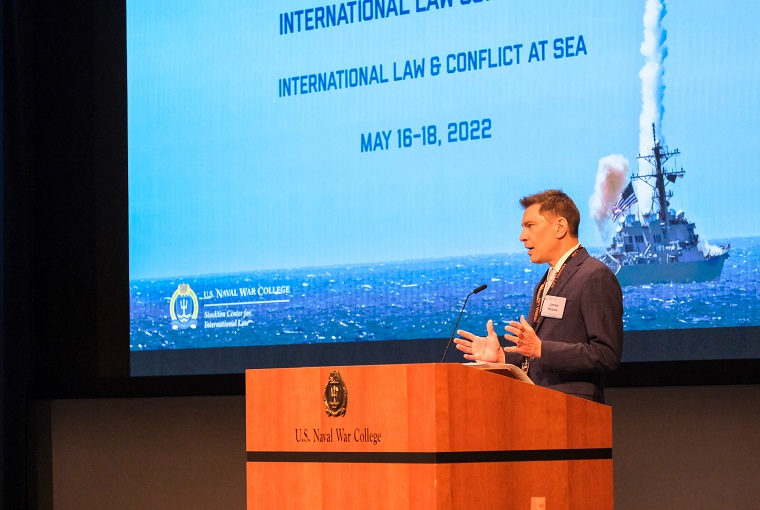Stockton Center for International Law Hosted 4th Annual Alexander C. Cushing International Law Conference

Newport, R.I. - The Stockton Center for International Law (SCIL) hosted the fourth annual Alexander C. Cushing International Law Conference at the U.S. Naval War College (NWC) in Spruance Auditorium, May 17-19. This year’s conference theme was “International Law: Conflict at Sea.”
The forum gathered around 150 judge advocates, scholars, and practitioners from around the world to hear remarks from various experts on international law, including Vice Adm. Darse “Del” E. Crandall, Judge Advocate General of the Navy who gave keynote remarks.
“The conference’s focus on ‘International Law: Conflict at Sea’ allows for a timely discussion of how international law and the future of Naval warfare is potentially being shaped by ongoing geopolitical conflicts. The broad range of perspectives provided by the conference participants, especially from our ally and partner nations, is critical to understanding how we can all work together to uphold the foundational principles of international law, upon which we all rely,” said Crandall. “Promoting these principles and discussing how we react to adversaries challenging these principles is vital to our efforts to maintain a rules-based order. This work enables our leaders to respond to the maritime security challenges we face around the world, most significantly in the Indo-Pacific.”
Conference panelists discussed the following topics: disruptive technologies at sea, fleet perspective on operational law, maritime interactions with China, maritime law enforcement, illegal, unreported, and unregulated (IUU) fishing, Russia and regional maritime security, maritime expeditionary operations and international law, maritime security law, Japan’s Senkaku Islands, the East China Sea and Taiwan, Korea’s maritime boundaries, and Indo-Pacific maritime security challenges.
Maj. Gen. David J. Bligh, USMC, Staff Judge Advocate to the commandant, discussed the importance of the conference.
“With a number of challenges facing our nation and our Navy-Marine Corps team, I am confident that with forums such as the Cushing conference and the close working relationship between my team, the Navy JAG, and the Stockton Center, we will be able to ensure our judge advocates are prepared to face these challenges.”
Charles H. Stockton Chair of International Law Professor James Kraska, U.S. Naval War College’s Stockton Center for International Law, discussed the goals of the conference.
“The conference serves three purposes–first, it helps to shape and influence international maritime law that underpins the legitimacy of Navy operations worldwide. Second, it educates future naval leaders and other influencers in international maritime law. Third, it engages with allies and partner nations and institutions to synchronize interoperability,” said Kraska.
Attendees of the conference learned about new technologies which are affecting maritime operations, such as autonomous ships, which will profoundly affect force structure and legal considerations during peacetime and armed conflict.
The Alexander C. Cushing International Law conference brings together scholars and practitioners from across the world to develop and shape international maritime law and governance. The conference focused on the rule of law and great power competition in the Indo-Pacific region and the Arctic Ocean, as well as exploring climate change and illegal fishing.
SCIL is a department in NWC’s Center for Naval Warfare Studies that produces original research and analysis of both international law and military operations to educate and inform military leaders, national decision-makers, and international law practitioners and scholars. Annually, the Stockton Center hosts legal research workshops on emergent issues, drawing many of the world’s leading international law experts, including the annual Alexander C. Cushing International Law Conference.
The U.S. Naval War College informs today’s decision-makers and educates tomorrow’s leaders. NWC provides today’s decision-makers and tomorrow’s leaders with educational experiences and learning opportunities that develop their ability to anticipate and prepare strategically for the future, strengthen the foundations of peace, and create a decisive war fighting advantage.
